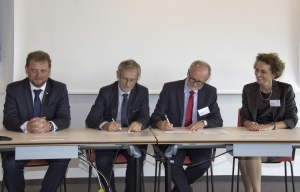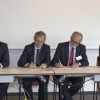First step towards computing XFEL data in Świerk
2017.09.04 12:43 - Marek PawłowskiMemorandum of Understanding in the matter of computing in NCBJ’s Computer Centre in Świerk scientific data acquired during experiments run at XFEL was reached between NCBJ and European XFEL GmbH on September 1, 2017.
The document was signed by Professor Robert Feindenhans’l, European XFEL GmbH Managing Director, and Professor Krzysztof Kurek, NCBJ Director General, in the presence of Professor Łukasz Szumowski, Polish Deputy Minister of Science and Higher Education, and Dr. Claudia Burger, European XFEL GmbH Management Board Managing Director, Administrative Director.
Scientific experiments run/measurements taken at so sophisticated facilities as European XFEL are usually generating huge volumes of data which need to be stored and computed. Powerful computer centres run by competent staff are required to successfully manage / compute such volumes. NCBJ’s Computer Centre (CIŚ) has been gathering necessary experience for a couple of years in the course of its cooperation with CERN (Geneva). CIŚ, a Tier-2 node in the CERN computer grid, is among the main sites where experimental data acquired at the LHCb detector (one of the four large experiments run at CERN’s Large Hadron Collider accelerator) are stored and processed.
Both signees of the Memorandum agreed to make every effort to discern capabilities and needs for remote processing of data generated in the course of research conducted in Hamburg. The agreed for specific activities include: (i) to propose architecture of a system capable to compute the data while providing necessary security / access control (elements of the system would be deployed in NCBJ Świerk), and (ii) to test throughput of links between Świerk and Hamburg.
“We are estimating that XFEL experiments will be generating between several and a few tens of petabytes each year” – said Eng. Adam Padee, PhD, Head of Laboratory for Information Technologies in NCBJ, coordinator of the project on behalf of NCBJ. “Two advantages emerging from possible solution in which a fraction of that data stream would be stored and processed in another computer centre, in this case in CIŚ, include: (i) significant relief for computing infrastructure used in Hamburg; (ii) increased safety and reliability.”
It is expected that works on putting the memorandum arrangements in effect will start within the few coming months as soon as some preparatory works are completed.



















